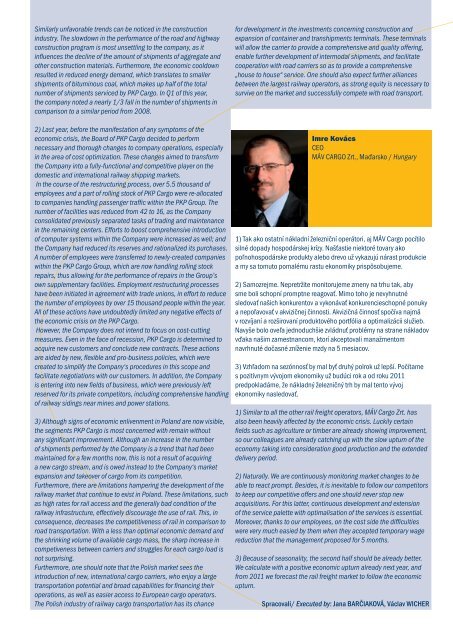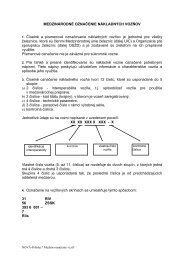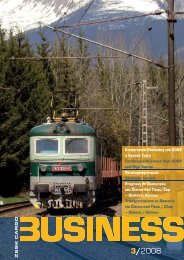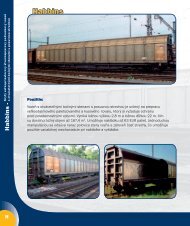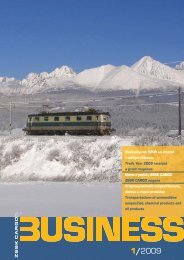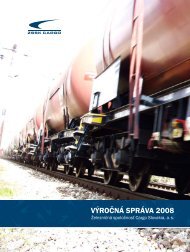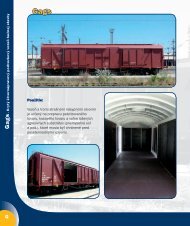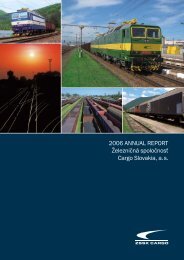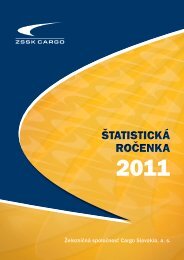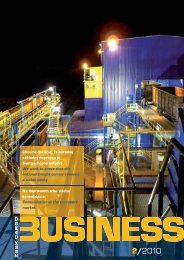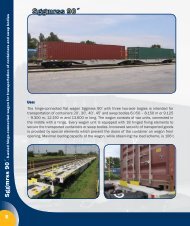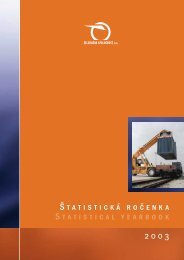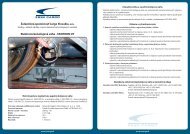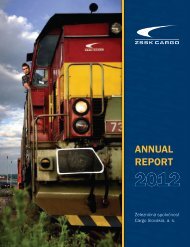CARGO BUSINESS 3-09.indd - ZSSK Cargo
CARGO BUSINESS 3-09.indd - ZSSK Cargo
CARGO BUSINESS 3-09.indd - ZSSK Cargo
Create successful ePaper yourself
Turn your PDF publications into a flip-book with our unique Google optimized e-Paper software.
Similarly unfavorable trends can be noticed in the construction<br />
industry. The slowdown in the performance of the road and highway<br />
construction program is most unsettling to the company, as it<br />
influences the decline of the amount of shipments of aggregate and<br />
other construction materials. Furthermore, the economic cooldown<br />
resulted in reduced energy demand, which translates to smaller<br />
shipments of bituminous coal, which makes up half of the total<br />
number of shipments serviced by PKP <strong>Cargo</strong>. In Q1 of this year,<br />
the company noted a nearly 1/3 fall in the number of shipments in<br />
comparison to a similar period from 2008.<br />
2) Last year, before the manifestation of any symptoms of the<br />
economic crisis, the Board of PKP <strong>Cargo</strong> decided to perform<br />
necessary and thorough changes to company operations, especially<br />
in the area of cost optimization. These changes aimed to transform<br />
the Company into a fully-functional and competitive player on the<br />
domestic and international railway shipping markets.<br />
In the course of the restructuring process, over 5.5 thousand of<br />
employees and a part of rolling stock of PKP <strong>Cargo</strong> were re-allocated<br />
to companies handling passenger traffic within the PKP Group. The<br />
number of facilities was reduced from 42 to 16, as the Company<br />
consolidated previously separated tasks of trading and maintenance<br />
in the remaining centers. Efforts to boost comprehensive introduction<br />
of computer systems within the Company were increased as well; and<br />
the Company had reduced its reserves and rationalized its purchases.<br />
A number of employees were transferred to newly-created companies<br />
within the PKP <strong>Cargo</strong> Group, which are now handling rolling stock<br />
repairs, thus allowing for the performance of repairs in the Group’s<br />
own supplementary facilities. Employment restructuring processes<br />
have been initiated in agreement with trade unions, in effort to reduce<br />
the number of employees by over 15 thousand people within the year.<br />
All of these actions have undoubtedly limited any negative effects of<br />
the economic crisis on the PKP <strong>Cargo</strong>.<br />
However, the Company does not intend to focus on cost-cutting<br />
measures. Even in the face of recession, PKP <strong>Cargo</strong> is determined to<br />
acquire new customers and conclude new contracts. These actions<br />
are aided by new, flexible and pro-business policies, which were<br />
created to simplify the Company‘s procedures in this scope and<br />
facilitate negotiations with our customers. In addition, the Company<br />
is entering into new fields of business, which were previously left<br />
reserved for its private competitors, including comprehensive handling<br />
of railway sidings near mines and power stations.<br />
3) Although signs of economic enlivenment in Poland are now visible,<br />
the segments PKP <strong>Cargo</strong> is most concerned with remain without<br />
any significant improvement. Although an increase in the number<br />
of shipments performed by the Company is a trend that had been<br />
maintained for a few months now, this is not a result of acquiring<br />
a new cargo stream, and is owed instead to the Company‘s market<br />
expansion and takeover of cargo from its competition.<br />
Furthermore, there are limitations hampering the development of the<br />
railway market that continue to exist in Poland. These limitations, such<br />
as high rates for rail access and the generally bad condition of the<br />
railway infrastructure, effectively discourage the use of rail. This, in<br />
consequence, decreases the competitiveness of rail in comparison to<br />
road transportation. With a less than optimal economic demand and<br />
the shrinking volume of available cargo mass, the sharp increase in<br />
competiveness between carriers and struggles for each cargo load is<br />
not surprising.<br />
Furthermore, one should note that the Polish market sees the<br />
introduction of new, international cargo carriers, who enjoy a large<br />
transportation potential and broad capabilities for financing their<br />
operations, as well as easier access to European cargo operators.<br />
The Polish industry of railway cargo transportation has its chance<br />
for development in the investments concerning construction and<br />
expansion of container and transhipments terminals. These terminals<br />
will allow the carrier to provide a comprehensive and quality offering,<br />
enable further development of intermodal shipments, and facilitate<br />
cooperation with road carriers so as to provide a comprehensive<br />
„house to house“ service. One should also expect further alliances<br />
between the largest railway operators, as strong equity is necessary to<br />
survive on the market and successfully compete with road transport.<br />
Imre Kovács<br />
CEO<br />
MÁV <strong>CARGO</strong> Zrt., Maďarsko / Hungary<br />
1) Tak ako ostatní nákladní železniční operátori, aj MÁV <strong>Cargo</strong> pocítilo<br />
silné dopady hospodárskej krízy. Našťastie niektoré tovary ako<br />
poľnohospodárske produkty alebo drevo už vykazujú nárast produkcie<br />
a my sa tomuto pomalému rastu ekonomiky prispôsobujeme.<br />
2) Samozrejme. Nepretržite monitorujeme zmeny na trhu tak, aby<br />
sme boli schopní promptne reagovať. Mimo toho je nevyhnutné<br />
sledovať našich konkurentov a vykonávať konkurencieschopné ponuky<br />
a nepoľavovať v akvizičnej činnosti. Akvizičná činnosť spočíva najmä<br />
v rozvíjaní a rozširovaní produktového portfólia a optimalizácii služieb.<br />
Navyše bolo oveľa jednoduchšie zvládnuť problémy na strane nákladov<br />
vďaka našim zamestnancom, ktorí akceptovali manažmentom<br />
navrhnuté dočasné zníženie mzdy na 5 mesiacov.<br />
3) Vzhľadom na sezónnosť by mal byť druhý polrok už lepší. Počítame<br />
s pozitívnym vývojom ekonomiky už budúci rok a od roku 2011<br />
predpokladáme, že nákladný železničný trh by mal tento vývoj<br />
ekonomiky nasledovať.<br />
1) Similar to all the other rail freight operators, MÁV <strong>Cargo</strong> Zrt. has<br />
also been heavily affected by the economic crisis. Luckily certain<br />
fields such as agriculture or timber are already showing improvement,<br />
so our colleagues are already catching up with the slow upturn of the<br />
economy taking into consideration good production and the extended<br />
delivery period.<br />
2) Naturally. We are continuously monitoring market changes to be<br />
able to react prompt. Besides, it is inevitable to follow our competitors<br />
to keep our competitive offers and one should never stop new<br />
acquisitions. For this latter, continuous development and extension<br />
of the service palette with optimalisation of the services is essential.<br />
Moreover, thanks to our employees, on the cost side the difficulties<br />
were very much easied by them when they accepted temporary wage<br />
reduction that the management proposed for 5 months.<br />
3) Because of seasonality, the second half should be already better.<br />
We calculate with a positive economic upturn already next year, and<br />
from 2011 we forecast the rail freight market to follow the economic<br />
upturn.<br />
Spracovali/ Executed by: Jana BARČIAKOVÁ, Václav WICHER


